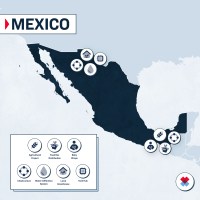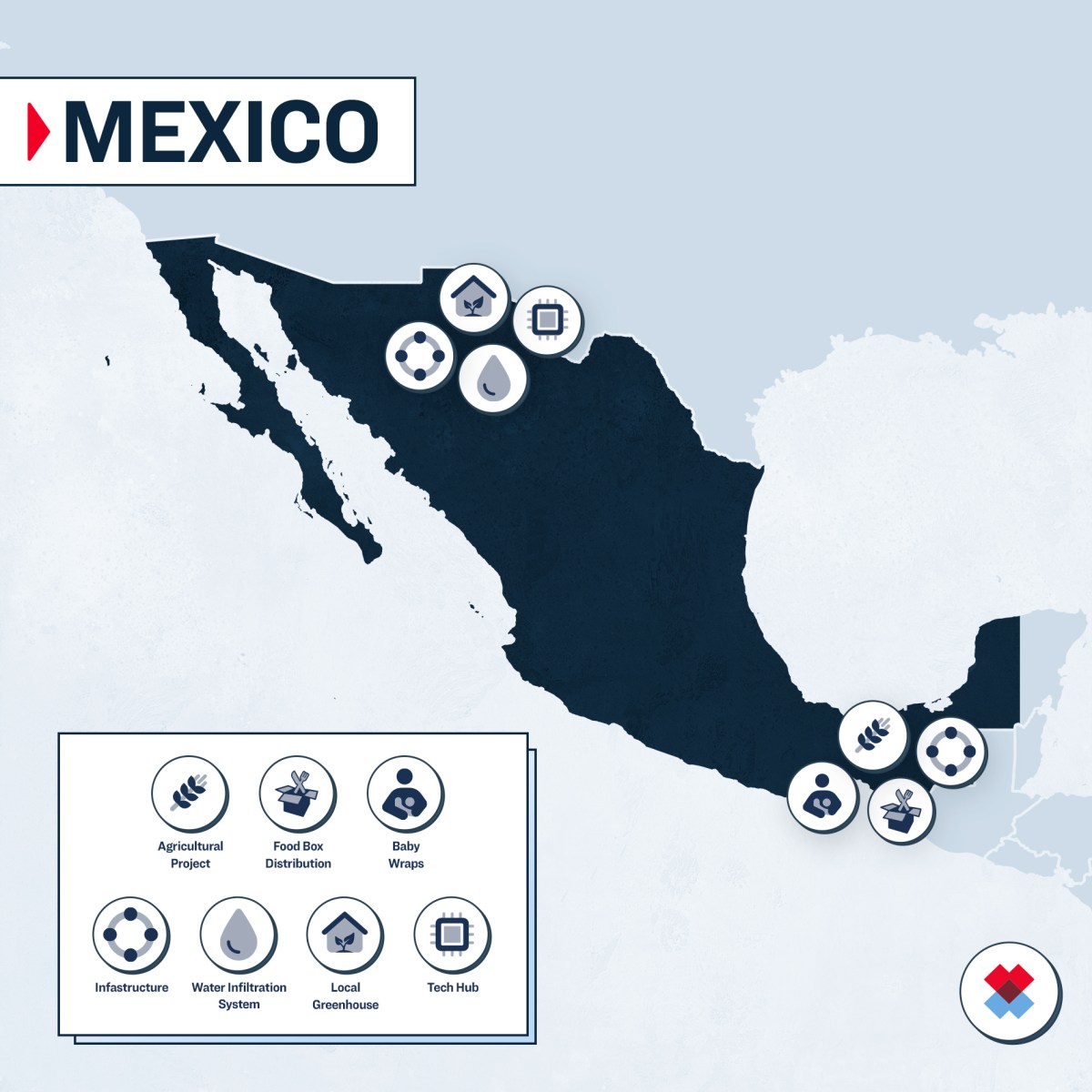Country Overview
Mexico limped into 2021, its economy having contracted by 8.5% in 2020. COVID-19 was still raging, hurting workers in the informal economy, especially women and youth. Throughout 2021, inflation rose to 7.36%, the highest in 20 years.
Despite these challenges, Mexico’s 2021 singular story is migration. Last year, Mexico received more than 131,000 asylum applications, the third-most in the world. This number does not include internally displaced persons (IDPs), Mexicans forced to leave their homes, communities, and livelihoods due to natural disasters, conflict, and violence. By the end of 2021, there were 379,246 IDPs in Mexico.
Along the migration route and near the US-Mexico border, cartel members prey on migrants, kidnapping, raping, or extorting them for profit.
Our relief efforts were concentrated in key cities at Mexico’s northern and southern borders to best serve our migrant friends. Our community of peacemakers’ generosity allowed us to respond in the following ways:
At the US-Mexico border
- 312 men, women, and children kept warm during the winter thanks to the purchase and installation of mini-splits in each of the 13 dorms at a local shelter.
- 1,962 of our migrant friends had clean drinking water as we continued maintaining a water filtration system at a local shelter that we installed earlier.
- 100 asylum seekers had fresh vegetables grown in a local greenhouse.
- 35 of our migrant friends enrolled in our pilot tech skills training program. 11 of our migrant friends graduated with enhanced tech, English language, and soft skills. Other students had started the training program, but they received permission to enter the US, so they didn’t finish it.
- Our pilot mobile tech bus was launched, so our migrant friends don’t have to leave the safety of the shelter to enhance their job training skills. School comes to them.
At the Mexico-Guatemala border
- 24 of our migrant friends planted 23 types of produce, which provided food for a local shelter and jobs through an agricultural project at a farm. Working alongside locals on the farm helped migrants and the local community bond.
- 122 families and single adults received food vouchers redeemable for the food items they like, restoring agency and dignity.
- 376 families received 500 food boxes (some families were so big, that they received two boxes), so moms, dads, and kids could eat nutritious food all month long.
- 295 baby wraps were produced and 60 were distributed, so moms and dads could keep their children close to them, safe, while having their hands free.
- Exhausted moms, dads, and kids can take a shower, rest in a shade-covered hammock, or eat energy-giving freshly-cooked food in a safe house we support. Now, there’s a newly built bathroom, kitchen, and hammock-strung covered gallery for families to recuperate before the next leg of their journey.
Migrants fleeing community-destroying violence, poverty, and natural disasters encounter traffickers, threats of sexual violence/kidnapping, and theft en route to safety. At borders and other points of entry, they lack access to food, shelter, jobs, and education while encountering more violence.
Customs and Border Patrol (CBP)
Although official policy restricts Customs and Border Patrol (CBP) from expelling migrants back to Mexico after dark, some border patrol guards ignore this policy. Often, migrants are attacked as they make their way to a shelter.
Kidnappers affiliated with drug cartels wait near the bridges where CBP officers leave removed migrants. If migrants do not know the correct password, they are kidnapped so the cartels can extort their families in the US for money. If no one pays, they are killed, enslaved, or disappeared.
Between January 6, 2021, and March 15, 2022, 9,886 victims were kidnapped, raped, tortured, or violently attacked after being expelled or blocked at a port of entry along the US-Mexico border.
Migration Protection Protocols (MPP) – “Remain in Mexico”
Migration Protection Protocols (MPP) dictate that migrants seeking asylum in the US have to wait in Mexico until they have their court dates. MPP puts migrants in danger because drug cartels control border towns and the areas around them. Smugglers are affiliated with the cartels. Those who try to cross without paying a fee are beaten or kidnapped. By smuggling people into the US, smugglers make more money, thereby increasing a cartel’s power. 55% of migrants hire a smuggler to reach their final destination.
MPP also causes bottlenecks for migrants at ports of entry. Shelters become overcrowded, vulnerable families don’t have enough food or clean water, and children miss out on school. Entire families sleep unhoused, in homemade lean-tos made of sheets held up by wooden poles or in parks or public squares, where women and children sleep close to the center to avoid being kidnapped. When in-need people are turned away, they are not given a specific date or time to return for a hearing. They are caught in a limbo of endless waiting, often without access to essential services.
Title 42
A 1980 US immigration law states that a port of entry is where a migrant seeking asylum should present him/her/themself. Title 42 allows border patrol to deny entry to people if they have traveled from a country with a communicable disease. Citing the need to stop the spread of COVID-19, CBP expelled migrants at the border before they had a chance to file their asylum claims. They are expelled to the country from which they entered (usually Mexico) or in some cases, to their country of origin. When Title 42 was applied to Haitian migrants waiting under the Del Rio Bridge in September 2021, some Haitians were expelled back to Haiti even though they had legal status in countries such as Brazil or Chile. Some were expelled with their children who held Chilean or Brazilian passports. These children were left stateless.


